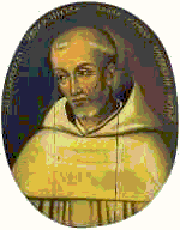
Bernard of Clairvaux
Born near Dijon, France, of Burgundian landowning aristocracy, Bernard grew up in a devout family atmosphere. His mother, Aleth, in particular, exerted a virtuous influence upon Bernard reminiscent of that exercised six centuries earlier by St. Monica over St. Augustine of Hippo. Aleth's death, in 1107, so affected Bernard that he later identified this moment of loss as the start of his path to complete conversion of life. Then, aged 17, he turned away from his literary education, and from any ambition for ecclesiastical advancement, toward a life of renunciation and solitude.
At the invitation of the abbot of Citeaux, Stephen Harding, Bernard entered this struggling, small, new community that had been established in 1098 as an effort to restore Benedictinism to a more primitive and austere pattern of life. He entered the Citeaux community in 1112 having remarkably persuaded his four brothers and some 25 other companions to join him and devoted the next three years to spiritual and theological studies.
In 1115 Stephen Harding appointed him to lead a small group of monks to establish a new monastery in difficult terrain at Clairvaux, on the borders of Burgundy and Champagne. Under Bernard's leadership, four brothers, an uncle, two cousins, an architect, and two other monks endured extreme deprivations for over a decade before Clairvaux was self-sufficient. It was here, in a hut near the monastery, that his first writings evolved, imbued with touches of poetic genius. Here, too, he produced a small but complete treatise on the Virgin Mary, "Praises of the Virgin Mother." Bernard was to become a major champion of a moderate cult of the Virgin, and is credited with composing the "Salve Regina" one of the best-loved antiphons to Our Lady.
His hey-day of influence upon the European stage was in the period between 1130 and 1145, when he acted as advisor to several popes and struggled to end the scandal of papal disunity, caused by the claims of several anti-popes (rivals, elected contrary to prevailing clerical procedures). During this time he also was induced to promote the ill-fated Second Crusade against the Muslims in the Holy Land (1147-49).
Bernard could also publicly rebuke a pope and call him to improvement, as he did in a memorable letter to Innocent II: "There is but one opinion among all the faithful shepherds among us, namely, that justice is vanishing in the Church, that the power of the keys is gone, that episcopal authority is altogether turning rotten..." He exhorted his former student Pope Eugenius to stress his role as spiritual leader of the church over his role as leader of a great temporal power.
As a contemplative, Bernard vigorously criticised dialectical Scholasticism as degrading God's mysteries. For him, "we search in a worthier manner, we discover with greater facility through prayer than through disputation." Possession of love is the first condition of the knowledge of God. Never afraid of controversy, Bernard stoutly opposed the rationalistic influence of the most popular dialectician of the age, Peter Abelard. Regretably however, his victory over Abelard seems to have been due less to his greater skill or cogency in argument than to his favoured position with the bishops and the papacy.
Bernard's best-known book, on the Canticle of Canticles, was written during this active time. He interprets Solomon's love-poem as was supremely a love-song to God: and for Bernard, the only way to know the Father perfectly is to love Him totally a conviction captured in his famous dictum: "What is the measure of the love of God? To love without measure!"
